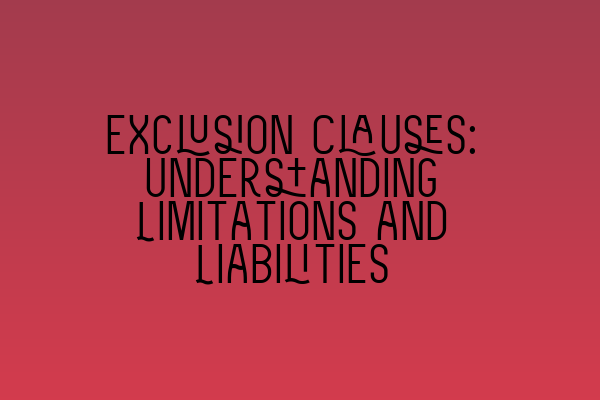Exclusion Clauses: Understanding Limitations and Liabilities
As a solicitor, it is important to have a solid understanding of exclusion clauses and their significance in contract law. Exclusion clauses are contractual terms that seek to limit or exclude liability for certain events or breaches of contract. They are commonly used in commercial contracts to protect parties from unforeseen circumstances or to allocate risk between the contracting parties.
In this article, we will delve deep into the intricacies of exclusion clauses and explore their limitations and liabilities. By the end of this article, you will have a comprehensive understanding of how exclusion clauses operate and the potential consequences they may have on contractual relationships.
The Purpose of Exclusion Clauses
Exclusion clauses serve several important purposes in contracts. They help parties define the scope of their contractual obligations, allocate risks and liabilities, and provide protection against potential losses. By incorporating these clauses, parties can anticipate and manage potential risks in advance, thereby reducing uncertainty and preserving commercial relationships.
Types of Exclusion Clauses
Exclusion clauses can take various forms and serve different purposes. Some common types of exclusion clauses include:
- Exclusion of Liability: These clauses seek to exclude or limit liability for certain types of damages or losses.
- Force Majeure: Force majeure clauses aim to excuse a party from performance obligations in the event of unforeseen and uncontrollable circumstances, such as natural disasters or government actions.
- Indemnity Clauses: Indemnity clauses require one party to compensate the other for specific losses or damages that may arise out of the contract.
- Time Limitations: Time limitation clauses set a deadline within which a party must bring a claim or take legal action.
It is crucial to note that the enforceability and interpretation of these clauses depend on various factors, including the clarity of the language used, the bargaining power of the parties, and the legal principles governing the contract.
The Doctrine of Unfair Contract Terms Act (UCTA)
The Unfair Contract Terms Act (UCTA) plays a pivotal role in regulating the enforceability of exclusion clauses. UCTA applies to both business-to-business contracts and contracts between businesses and consumers. It seeks to protect parties from unfair terms and provisions that may create an imbalance of power or unreasonably exclude or restrict liability.
Under UCTA, exclusion clauses can be deemed unfair and unenforceable if they fail to satisfy the reasonableness requirement. The reasonableness test takes into account various factors, such as the bargaining power of the parties, the availability of alternatives, and the nature of the contract. It is, therefore, crucial to carefully draft exclusion clauses to ensure they are reasonable and comply with UCTA.
Limitations and Liabilities
While exclusion clauses can provide essential protection to contracting parties, they have certain limitations and potential liabilities that should be considered. Firstly, as mentioned earlier, exclusion clauses must satisfy the reasonableness requirement under UCTA to be enforceable. Failing to meet this requirement may render the clause void and leave the party exposed to potential liabilities.
Furthermore, exclusion clauses may not be effective in all circumstances. They may not limit or exclude liability for certain types of damages, such as personal injury or death, which are protected by law and public policy. Additionally, if an exclusion clause is found to be ambiguous or unclear, a court may interpret it against the party seeking to rely on it.
Conclusion
Exclusion clauses play a pivotal role in contract law, allowing parties to allocate risks and liabilities and protect their interests. However, their enforceability and effectiveness depend on various factors, including the reasonableness requirement under UCTA and the specific circumstances of the contract.
As a solicitor, it is crucial to have a thorough understanding of exclusion clauses and their limitations. By staying up to date with the latest legal developments and case precedents, you can provide sound advice to clients and effectively negotiate contracts that protect their interests.
If you would like to further enhance your understanding of contract law and prepare for the SQE exams, we invite you to explore our SQE 1 Practice Exam Questions and SQE 1 Practice Mocks FLK1 FLK2. Additionally, we offer comprehensive SQE 2 Preparation Courses and SQE 1 Preparation Courses to help you excel in your studies. Stay informed with the latest SRA SQE Exam Dates and embark on your journey to become an accomplished solicitor.
